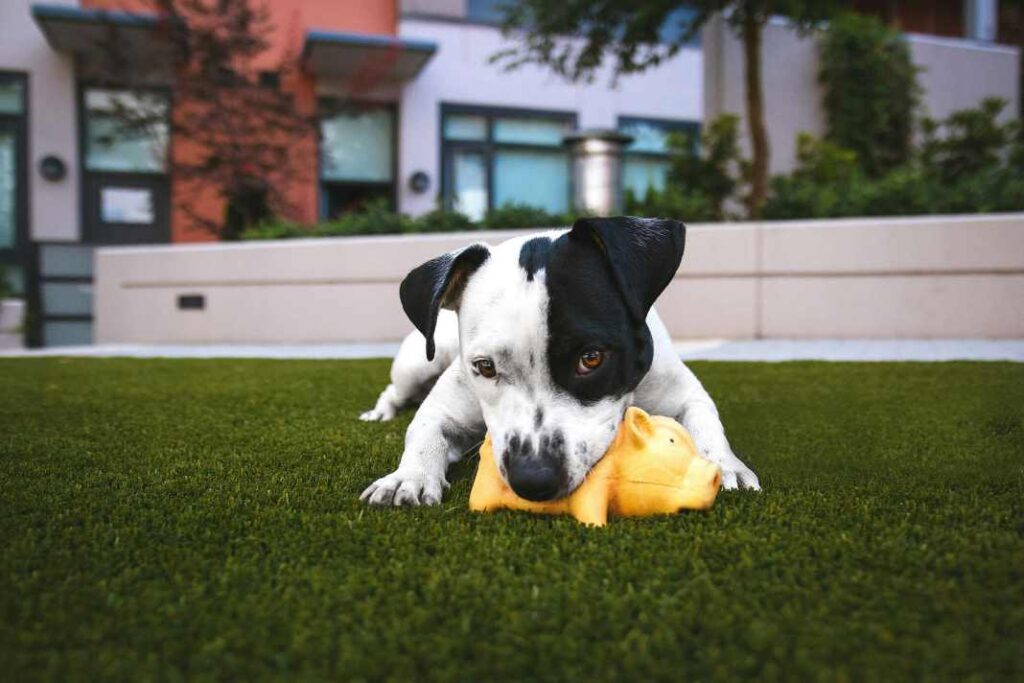Discover the importance of play in puppy development. Explore its significance in cultivating life skills, reaping physical and mental advantages, fostering socialization, and nurturing cognitive and emotional growth.
Plus, gain valuable insights into effective training techniques and strengthening bonds with your furry companion.
Click here for Expert Videos to Stop Dog Behavioral Problems!
Overview of the Importance of Play in Puppy Development
Play is a crucial aspect of a puppy’s early life, where they learn essential life skills such as bite inhibition and discipline from interactions with their mother and litter mates. These early interactions through play help puppies understand boundaries and develop social skills that are important for their well-being throughout life.
For example, when puppies engage in play with their litter mates, they learn about communication cues and how to moderate their bite strength, which is crucial for appropriate social interactions as they grow older.
Positive play experiences are vital for puppies and involve managing their energy levels, providing structured socialization opportunities, and avoiding unsupervised play. Structured play can help puppies understand how to engage with others respectfully while also learning to control their impulses.
By setting boundaries during playtime, puppy owners can guide their pets towards appropriate behavior and prevent potential issues from arising in the future. Additionally, incorporating interactive toys and engaging in diverse play activities can stimulate a puppy’s mind and promote overall cognitive development.

The Benefits of Play for Puppy Development
Playtime provides essential benefits for puppies by offering them physical exercise, mental stimulation, and opportunities for socialization. For instance, when puppies engage in play with other dogs, they learn important social skills such as bite inhibition and communication skills.
This interaction not only helps in developing their social abilities but also enhances their emotional well-being by reducing stress and anxiety levels.
Playtime is crucial for puppies, providing exercise, mental stimulation, and social skills development, fostering overall growth and reducing stress.
In addition to the social and emotional benefits, play contributes significantly to a puppy’s cognitive development. Problem-solving games incorporated during playtime can engage a puppy’s cognitive abilities, promoting mental growth and agility.
For example, interactive toys and puzzle toys not only occupy a puppy’s mind but also enhance their focus and attention span, which are crucial for their overall cognitive development.
By engaging in various play activities that challenge their minds, puppies can become more adaptable and intellectually stimulated, setting a strong foundation for their learning and problem-solving skills later in life.

Socialization Through Play
Socialization through play is crucial for a puppy’s development, shaping their ability to communicate effectively and exhibit appropriate behavior towards other dogs.
For instance, when puppies engage in play with their peers, they learn to understand canine body language, vocalizations, and social cues, which are vital for healthy interactions.
This process helps them develop important skills like bite inhibition, where they learn to control the force of their bites, an essential aspect of socializing with other dogs.
Socialization through play teaches puppies vital communication skills and behaviors, essential for healthy interactions and preventing future behavioral issues.
Furthermore, supervised play sessions and structured socialization activities offer puppies the opportunity to learn how to navigate different social situations and environments.
For example, enrolling a puppy in a puppy socialization class can provide a safe and controlled setting for them to interact with unfamiliar dogs, helping them build confidence and learn appropriate play behaviors.
These experiences not only contribute to the puppy’s social growth but also play a significant role in preventing future behavioral issues related to fear or aggression towards other dogs.
Through positive socialization experiences, puppies can grow into well-adjusted adult dogs who are comfortable and polite in various social settings.
Cognitive and Emotional Benefits of Play for Puppies
Playtime offers numerous cognitive and emotional benefits for puppies. Not only does it reduce stress and anxiety levels, but it also provides mental stimulation that is essential for a puppy’s cognitive development.
For example, when a puppy engages in interactive games like puzzle toys, it not only keeps them entertained but also challenges their problem-solving skills, thus promoting mental agility.
These activities help puppies learn to focus, think critically, and adapt to new situations, all of which are crucial for their cognitive well-being.
Playtime reduces stress, enhances mental agility, and improves emotional well-being in puppies through interactive games and problem-solving activities.
Moreover, play sessions that involve interactive toys can have a positive impact on a puppy’s emotional state. These toys often require the puppy to work for treats or figure out a puzzle, which can boost their confidence and provide a sense of accomplishment.
This mental enrichment through play can also help prevent boredom and alleviate behavioral issues that may arise from lack of mental stimulation.
Therefore, incorporating a variety of interactive toys and activities into a puppy’s playtime routine can contribute significantly to their emotional well-being and overall development.
Play Activities to Enhance Puppy Development
When considering play activities to enhance the development of puppies, it is crucial to incorporate training commands into these interactions.
For instance, teaching a puppy to “sit” before throwing a toy or asking them to “wait” before initiating a game of fetch can create a positive association between obedience and play.
By integrating these commands seamlessly into playtime, puppies not only learn basic commands but also reinforce their responsiveness and discipline, setting a strong foundation for future training sessions and overall behavior.
Moreover, varying play activities and regularly introducing new toys can significantly benefit a puppy’s mental agility and prevent boredom.
Incorporate training commands into play to enhance puppies’ obedience and cognitive development during diverse activities.
For example, rotating puzzle toys, interactive feeders, and different textures of chew toys can keep a puppy engaged and mentally stimulated.
This variety challenges their cognitive abilities, encourages problem-solving skills, and helps them adapt to new stimuli, contributing to their overall mental development and well-being.
Additionally, engaging in a mix of play styles such as fetch for physical exercise, hide-and-seek for mental stimulation, and tug-of-war for bonding experiences offers a holistic approach to a puppy’s developmental needs.
These diverse activities cater to different aspects of a puppy’s growth, ensuring a well-rounded and enriching playtime that nurtures their physical, cognitive, and emotional development.
Click here for Expert Videos to Stop Dog Behavioral Problems!
Training Strategies and Bonding Through Play
Redirecting play towards toys and rewarding acceptable behaviors during play sessions can aid in training puppies effectively. For instance, when teaching a puppy to fetch, rewarding them with a treat or verbal praise each time they retrieve the toy can reinforce the behavior and encourage them to continue playing fetch.
This positive reinforcement creates a link between the desired behavior and a pleasant outcome, making the training process more effective and enjoyable for the puppy.
Additionally, incorporating obedience commands like “sit” or “stay” during play sessions can help puppies associate these commands with fun activities, strengthening their responsiveness and understanding of basic commands.
Encouraging basic training commands during playtime not only helps in obedience training but also sets a foundation for a strong bond between puppies and their owners.
Using toys and rewards during play teaches puppies to associate obedience with fun, strengthening training and owner bonds.
By using play as a training tool, owners can establish themselves as leaders in a positive and interactive way, earning the puppy’s respect and trust.
For example, teaching a puppy to drop a toy on command during a game of tug-of-war not only enhances their training but also deepens the bond as they learn to respond to the owner’s cues.
This mutual understanding and communication during play can strengthen the emotional connection between the puppy and the owner, laying the groundwork for a harmonious and fulfilling relationship.
Additionally, spending quality playtime with puppies can create lasting memories and positive associations, further solidifying the bond between the puppy and their human companions.
Unlocking the Benefits of Early Socialization: Boosting Your Dog’s Well-being and Contentment

Discover how embracing early socialization can enhance your dog’s behavioral responses, foster immune system development, and contribute to their overall well-being.
Continue reading: Unlocking the Benefits of Early Socialization




